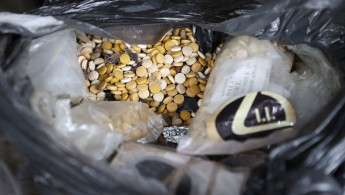Jordan and Russia meet to combat drug smuggling from Syria
Jordan's foreign minister met with Russia's envoy to Syria in Amman on Wednesday to discuss ways to curb drug smuggling from southern Syria, the source of much of the region's drug trafficking.
The Jordanian foreign ministry published a statement "stressing the importance of Russia's role to maintain stability in southern Syria" and confirming Russia's willingness to cooperate to combat drug trafficking.
The readout also thanked Russia for its role as the guarantor of the 2018 reconciliation agreements, which laid out the terms under which the Syrian regime retook formerly-opposition-held southern Syria.
Wednesday's meeting comes after a visit by Russian Foreign Minister Sergey Lavrov in November, where Syria was the main focus.
In recent years, Jordan has struggled with the trafficking of drugs, mainly the amphetamine captagon and hashish, originating from southern Syria.
Despite a thaw in relations between the two countries in the summer of 2021, there was a spike in trafficking incidents over the past year.
Jordan has pointed to Iranian-linked militias and the regime as the source of the drug smuggling, while analysts also say that Lebanon's Hezbollah militia is active in the trade.
"Russia is the only viable and reliable partner for Jordan in southern Syria. It doesn't have many other options, since Iran and the Syrian regime are part of the problem," Oraib Rantawi, the founder of the Amman-based Quds Center for Political Studies, told The New Arab.
In the summer of 2021, Jordan's King Abdullah unveiled a plan for a political solution in Syria.
Steps were taken after that to normalise relations between the two countries, including a call between Abdullah and Syrian President Bashar al-Assad in October 2021, the first contact between the two leaders since the beginning of the Syrian revolution in 2011.
Analysts have said that Jordan was hoping to promote stability and promote trade on its northern border with Syria through reconciliation, but has yet to see results from diplomatic detente with the regime.
"We haven't seen serious efforts from the regime to clean up southern Syria. There are still troubles with drugs, crime, gangs and ISIS. This is an obstacle to reconciliation between the two countries," Rantawi said.
Russia has acted as a facilitator between the two countries and has styled itself as a counterweight to Iran in Syria. Jordan has maintained that the presence of Iranian militias in southern Syria is a national security concern, particularly when it comes to their role in Syria.
“While Russia has conducted patrols near the Syrian-Jordanian border to reassure the Jordanian government … its capacity has been limited in translating results,” Caroline Rose, a director at the New Lines Institute for Strategy and Policy and captagon expert, told TNA.
Rose explained that Russia’s capacity to limit drug production and the presence of Iran has been reduced since the Ukraine war, due to a reduced Russian military presence and funding in Syria.
Residents of southern Syria have also questioned Russia's commitment to stopping drug trafficking and constraining Iranian militias.
"Russia is a foundational part of the smuggling operations. They know where the drug factories are in Daraa. If Russia wanted to stop the smuggling operations, it would be able to do so in 48 hours," Abu Howd al-Hourani, a resident of Daraa, told TNA when asked about the Russia-Jordan meeting.
"Russia's public position is that it is against the smuggling operations, but the reality is much different," al-Hourani said.
Before the reconciliation agreements in 2018, Jordan played an active role in supporting the Syrian opposition in southern Syria by allowing weapons to transit from its territory and hosting rebel operation rooms.
The proliferation of the so-called Islamic State (IS) and Iranian militias has led Jordan to prioritise stability in southern Syria over all else.
Recent turmoil in the country's south, with uprisings in Suweida province, assassinations in Daraa and the revelation that the top IS leader was hiding out just a few dozen kilometres from the Jordanian border, has alarmed the country.
Editor's note: This article was updated at 5:52 UK time to include a quote by Caroline Rose.





 Follow the Middle East's top stories in English at The New Arab on Google News
Follow the Middle East's top stories in English at The New Arab on Google News


